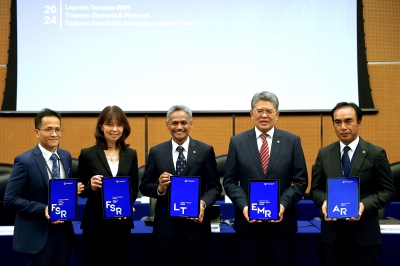KUALA LUMPUR, March 24 — Malaysia should not utilise its international reserves to counter long-term pressures on the ringgit’s exchange rate, the country’s central bank said today.
Bank Negara Malaysia (BNM) said in its Annual Report 2024 that structural reforms are necessary to address fundamental economic challenges affecting the ringgit, whereas reserve interventions are suited to handling short-term volatility.
“Relying too heavily on international reserves to counter long-term drivers rooted in fundamental factors may not be the appropriate strategy,” BNM said.
Instead, BNM advocated for financial market developments and policies that strengthen productivity and competitiveness.
Among others, it said structural reforms, including the New Industrial Master Plan 2030 and the National Energy Transition Roadmap, were key to improving Malaysia’s economic resilience.
The ringgit has struggled against the US dollar in recent years, driven primarily by the US Federal Reserve’s repeated interest rate increases to control runaway inflation.
Though the Malaysian currency briefly climbed as high as 4.12 against the dollar last October, it has given up most of the ground it regained and is maintaining a six-month average of 4.41.
Earlier this week, Bloomberg reported that BNM was one of three central banks facing a “cash crunch” as a result of efforts to combat the strength of the US dollar.
One analyst in the report said BNM has used currency forwards to help support the ringgit, increasing its net short position in the forward market.
Along with the country’s high loan-to-deposit ratios, this has resulted in a tightening of interbank liquidity.







